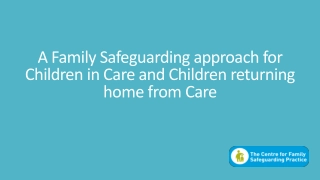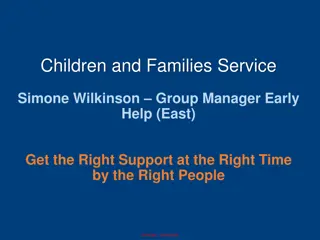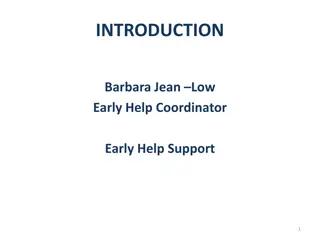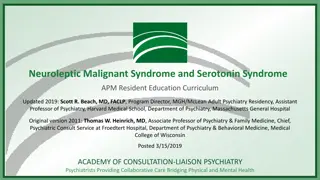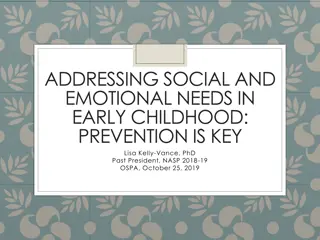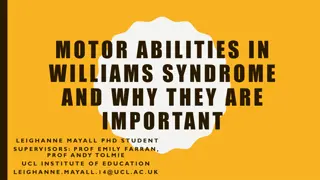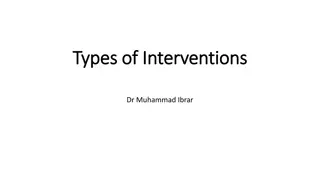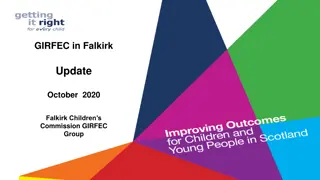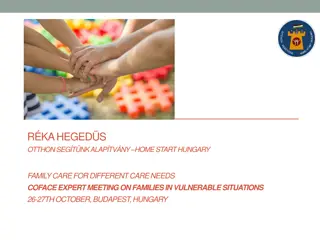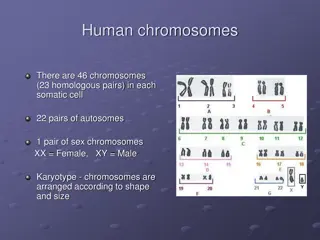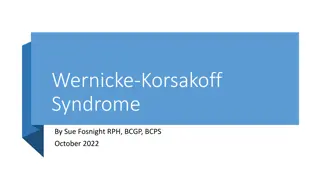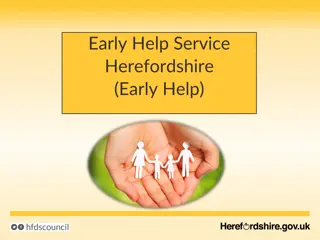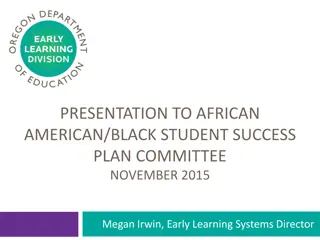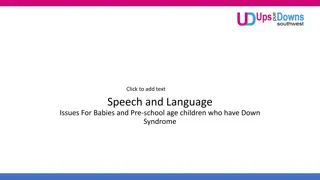Supporting Families of Young Children with Down Syndrome: Early Intervention Insights
Early intervention for children with Down syndrome is crucial for their lifelong learning, behavior, and overall health. This involves support and advice for families, training programs, and collaboration with various experts. The focus is on integrating interventions into daily routines to make them effective and meaningful for children and families.
Download Presentation

Please find below an Image/Link to download the presentation.
The content on the website is provided AS IS for your information and personal use only. It may not be sold, licensed, or shared on other websites without obtaining consent from the author.If you encounter any issues during the download, it is possible that the publisher has removed the file from their server.
You are allowed to download the files provided on this website for personal or commercial use, subject to the condition that they are used lawfully. All files are the property of their respective owners.
The content on the website is provided AS IS for your information and personal use only. It may not be sold, licensed, or shared on other websites without obtaining consent from the author.
E N D
Presentation Transcript
Supporting families of young children with Supporting families of young children with Down syndrome Down syndrome Eimear Collins Early Intervention Officer, Down Syndrome Ireland 22nd September 2018
Early Intervention Officer Role: Support and advice for families of young children (birth 6 years) Develop and deliver training to families and those working with young children early childhood care and education services, early intervention teams Support branches to deliver evidence based early intervention services for members Work with team, branches and individual members to identify problems with state provisions and lobby for improvement e.g. ECCE overage exemption Develop supports and resources for new parents
Early Intervention The experiences children have early in life influence lifelong learning, behaviour, and both physical and mental health (Centre for the Developing Child, 2017) Studies show that early intervention carries a better outcome for the general health, quality of life and life expectancy of people with Down syndrome (Down Syndrome Medical Interest Group, 2015). Generally understood in terms of services provided by external experts Psychologists Speech and Language Therapists (SLT s) Physiotherapists Occupational Therapists (OTs) Paediatricians Social Workers Educationalists
Early Intervention "The most powerful influence on the progress of a baby with Down syndrome is to be loved, wanted and absorbed into the everyday life of the family and of the community. Specific teaching and therapies will definitely help but must be kept in perspective and not allowed to create stress and anxiety for families Profs. Sue Buckley & Ben Sacks.
Early Intervention While specialists and therapists are experts in their fields, they are not the most important part of early intervention. The most important part is you - parents and family, along with the child. You know your own child best, and are the primary source of early intervention for your child
Routines based intervention Routines that occur within natural environments for young children provide the most effective framework to support and sustain early intervention activities (Vygotsky, 1933). Daily routines as context for intervention, families can integrate them into natural activities without disrupting the flow of what children are doing and learning Skills learned are functional and meaningful for children and families Interventions can be integrated in very natural ways into play, caregiving, and other activity based routines, including: Playtime Nappy changing time Handwashing Mealtimes Reading books
Routines Based Intervention (McWilliam, 2010)
Shared reading Shared reading comprises reading interactions between an adult and a child, in which the adult primarily reads the text and engages the child in talk or activities relating to the book (Pillinger and Wood, 2014) bedtime stories!? Irish research - Parents spoke about guilt of not doing enough therapy , hoping that reading together compensates for not doing other early intervention due to other life and family demands (Lusby, 2017) However, research into shared reading: Supports the development of emergent literacy skills for children with disabilities Teaching reading to teach talking is probably the single most effective intervention for helping children with Down syndrome Teaching them to read may be the most effective therapy for developing their speech and language skills from infancy right through school years (Sue Buckley)
Responsive Teaching Early intervention model derived from research conducted primarily with children with Down syndrome and their mothers in the 1980 s During early childhood, parents can promote their children's development by engaging in highly responsive interactions throughout their daily routines (Mahoney et al, 2006) Focus on encouraging their children to say and do things they already know, joining their activity by doing or saying things that are similar to what their children are doing Helps to maximise children's development and social-emotional well-being
Responsive teaching Strategies are 'easy to remember' suggestions that parents can incorporate into daily routines Designed to promote three areas of development: Cognition - children's ability to think, reason, solve problems and learn new information about their world and relationships Communication - children's ability to communicate through nonverbal, symbolic and spoken language Social-emotional functioning - children's ability to engage in interactions with parents, adults and other children as well as to comply with reasonable rules and expectations.
Responsive teaching 66 Responsive teaching strategies in total Examples: Respond to unintentional vocalisations, facial displays and gestures "as if" they were meaningful conversation Accept incorrect word choice and pronunciation approximations by responding to my child's intention or word Play frequently together Play with sounds back and forth Play face-to-face games without toys Be animated Turn routines into games Follow my child's focus of attention
Theyre only playing? Much of children s early learning and development takes place through play and hands-on experiences. Children explore social, physical and imaginary worlds. These experiences help them to manage their feelings, develop as thinkers and language users, develop socially, be creative and imaginative and lay the foundations for becoming effective communicators and learners (NCCA, 2009) Children with Down syndrome generally follow the same developmental stages of play as typically developing children.
Play However, children with Down syndrome: May be less likely to request and explore new objects May be less persistent at play May get stuck in repetitive play Adults may need to act as play partners for longer, scaffolding children s learning and modelling new skills and play activities. Other children can also be effective play partners.
Developmental profile Every single child is unique, with their own personality, disposition and abilities. Research has highlighted a specific pattern of cognitive and behavioural features observed among children with Down syndrome. This specific pattern of strengths and needs can be called a 'developmental profile'.
Developmental profile Factors that can support development and learning: Strong visual awareness and visual learning skills Ability to learn and use sign, gestures and visual supports Ability to learn using the written word Good social interactive skills, including imitating and copying the behaviour and attitudes of peers and adults
Developmental Profile Factors that can inhibit development and learning: Speech and language difficulties Poor short-term auditory memory (working memory) Short concentration span Delayed fine and gross motor skill development Vision and hearing impairments
See and Learn Targeted, evidence-based activities designed to support early development for children with Down syndrome Speech - designed to teach young children to hear and produce speech sounds (phonemes), to hear the differences between sounds (discrimination), to develop their speech sound system (phonology), and to produce clear speech (from approx. 6 months) Language and reading - designed to teach children to understand and use spoken language from first words to early grammar and simple sentences. It also introduces children to reading first sight words, learning letter-sounds and using phonics for reading (from approx. 18 months) Number skills - designed to teach young children to learn to count, to link numbers to quantity, to understand important concepts about the number system and to calculate with numbers up to 10 (from approx. 3 years) www.seeandlearn.org
Pair the Square! Designed by 2 Irish Speech & Language Therapists found they were making resources to suit different language levels and needs Designed a graded puzzle system. Many puzzles can be made from the one puzzle Can be used to develop: matching skills, fine motor skills, language comprehension, language expression, expression of sign and turn-taking (links on website to youtube clips) www.rascalresources.ie Thank you to Rascal Resources for their kind donation!
Pair the Square Picture matching skills Turn-taking skills: a nice activity for group; encourage each child to take a turn matching or naming a picture. Also a game of identifying the functions of objects e.g. which one can you sit on, which one can you eat Understanding of language e.g. find the ball, find the one that is cold, find an animal, find the ball, find something green. Building sentences e.g. you can blow bubbles, I cycle my bike, I eat a green apple Understanding and expression of concepts e.g. cold ice-cream, pink balloon, hairy dog, green apple, fast train Story formulation e.g. placing all items on one slider in a story
Early Intervention Services Experiences and suggestions
Eimear Collins Early Intervention Officer eimear@downsyndrome.ie
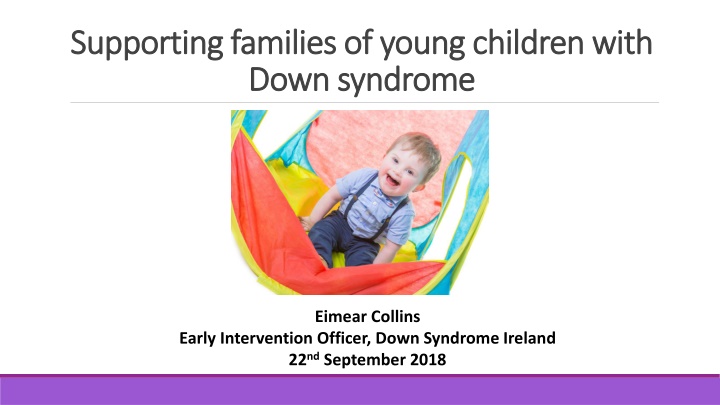

![❤[PDF]⚡ Zee Zee Does It Anyway!: A Story about down Syndrome and Determination](/thumb/20462/pdf-zee-zee-does-it-anyway-a-story-about-down-syndrome-and-determination.jpg)
